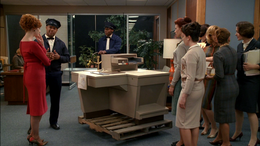Mad technology
SPOILER WARNING: Here be dragons for anyone who has not watched Mad Men through Season 7, episode 12.
This is the last year I can drift into obsession with the latest episodes of the TV series Mad Men that has given me so many new perspectives on my own childhood: two more episodes will close out its eight-year run. Myriad blogs cover the show, its costume design, and its decor. The show repays close study: in these last few episodes series creator Matthew Weiner is paying off meticulously set-up details from years past. Technology is the one area where Weiner has taken some temporal license: the IBM Selectrics on the February 1960 secretarial desks in the pilot (Season 1, episode 1, "Smoke Gets in Your Eyes") weren't introduced until 1961. The office manager, Joan Holloway, later Harris (Christina Hendricks), tells first-day-on-the-job Peggy Olson (Elisabeth Moss) not to be scared of "all this technology". Joan also introduces Peggy to a new technology of greater personal and social significance: the birth control pill, which in real life arrived a couple of months later. The typewriter never gives her any trouble, but the pill...was inadequately documented (S1e13, "The Wheel").
The technology Weiner foregrounds is aviation. Personally, it offers both dreams (S1e08, "The Hobo Code"), and disaster (S2e02, "Flight 1"). In business, the show's ad men measure achievement by signing an airline and a car. They fight for Honda (S4e05, "The Chrysanthemum and the Sword"), Jaguar (S5e11, "The Other Woman"), and Chevy (S6e06, "For Immediate Release"). They are forced to resign the small, regional carrier Mohawk (bought by Allegheny in 1972, swallowed by US Airways in 1979) to try for American (a rare survivor). One of the show's most memorable fictional-real moments is, of course, the moon landing (S7e07, "Waterloo"). If they only knew.
Because: as it has turned out, the 1960s were the last decade in which people still measured progress in terms of transport. We landed on the moon, and stalled.
A second strand of technological development changes the tools advertisers have available. The art department moves from illustrations to photography, as Sal (Bryan Batt) laments (S3e04, "The Arrangements"). Cameras evolve: the Polaroid arrives to show Don an unwelcome instant truth (S1e04, "The Hobo Code"), and super-slow motion lets Peggy offer a bean ballet (S5e01, "A Little Kiss"), an ad I personally would have loved to see but that Heinz resisted. Black and white television and radio give way to color - a simple win for a Sunkist orange (S6e11, "Favors").
In her 2008 book The Age of Unreason, Susan Jacoby argues that the highly visible 1960s counter-culture overshadowed the forming Christian right. Similarly, here aviation and media overshadow the technology that has meant progress ever since: computers. The characters notice more than we do.
At the show's 1960 opening, the Sterling Cooper agency has a secretary per executive, a huge, central pool of typists, and a small room for three switchboard operators who patch through phone calls with cables and plugs and, one says, "ice our wrists". Male lead Don Draper (Jon Hamm) is king: he can disappear without notice or explanation, insult and fire clients, and break every rule of reasonable behavior because his rare creative imagination enables everything else.
New phone systems and intercoms soon see off the switchboard operators.  The Xerox 914 copier arrives (S2e01, "For Those Who Think Young") to disperse the typing pool. Teleconferencing links the New York and California offices. By 1970, an IBM 360 displaces the creatives from their lounge (S7e04, "The Monolith").
The Xerox 914 copier arrives (S2e01, "For Those Who Think Young") to disperse the typing pool. Teleconferencing links the New York and California offices. By 1970, an IBM 360 displaces the creatives from their lounge (S7e04, "The Monolith").
The arc of today's world begins to clarify when the principals arrive at McCann-Erickson, the show's Hell. "McCann is mission control," the weaselly, data-loving Harry Crane (Rich Sommer) gloats to Roger Sterling (John Slattery). "Statisticians, programmers...ten men and five women just handling data!" These include Bill Phillips (Eric Ninnenger), whose research approach commentators Tom and Lorenzo sum up:
Don's very best pitches were about finding universal experiences in products; about appealing to people's broader emotions and desires - for love, acceptance, family, romance. Bill Phillips' approach was to describe a very specific customer and claim that this was the exact person they should be targeting in their approach. It's micro-marketing, not advertising. It limits people to a series of tics and behaviors rather than appealing to their better natures.
This is, as noted here two weeks ago, a recurring theme. You could say it as Apple versus Google: Apple hires great, intuitive designers and lets them work; Google tests 43 shades of blue - perhaps no coincidence that the Mad Men episode pondering the different ways individuals see the world is titled "The Color Blue" (S3e10). The consequences for the quants winning are profound: Don Draper needed no one else's inner thoughts; the data-ravenous Harrys of this world are increasingly privacy-invasive.
In the show's 1970, the characters are settling back into new stability. Pete Campbell (Vincent Kartheiser), sums it up while meditating on his brief, giddy flirtation with changing his life in California: "Now it sort of feels like a dream. But at the time it felt so real" (S7e08, "Severance"). Corporate America is swallowing the counter-culture and spitting out anyone who can't assimilate. As they do not know, twenty years in their future the internet will revive these same battles.
Wendy M. Grossman is the 2013 winner of the Enigma Award. Her Web site has an extensive archive of her books, articles, and music, and an archive of earlier columns in this series. Stories about the border wars between cyberspace and real life are posted occasionally during the week at the net.wars Pinboard - or follow on Twitter.